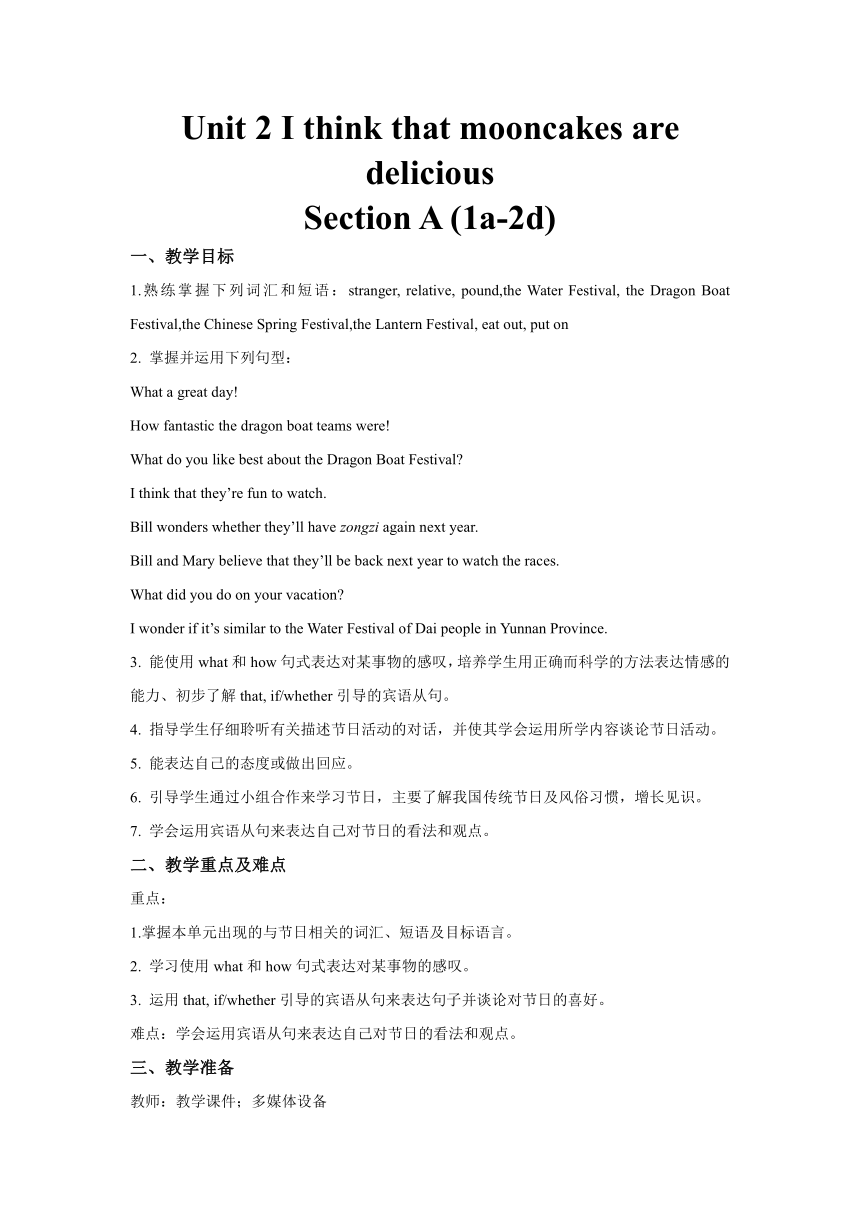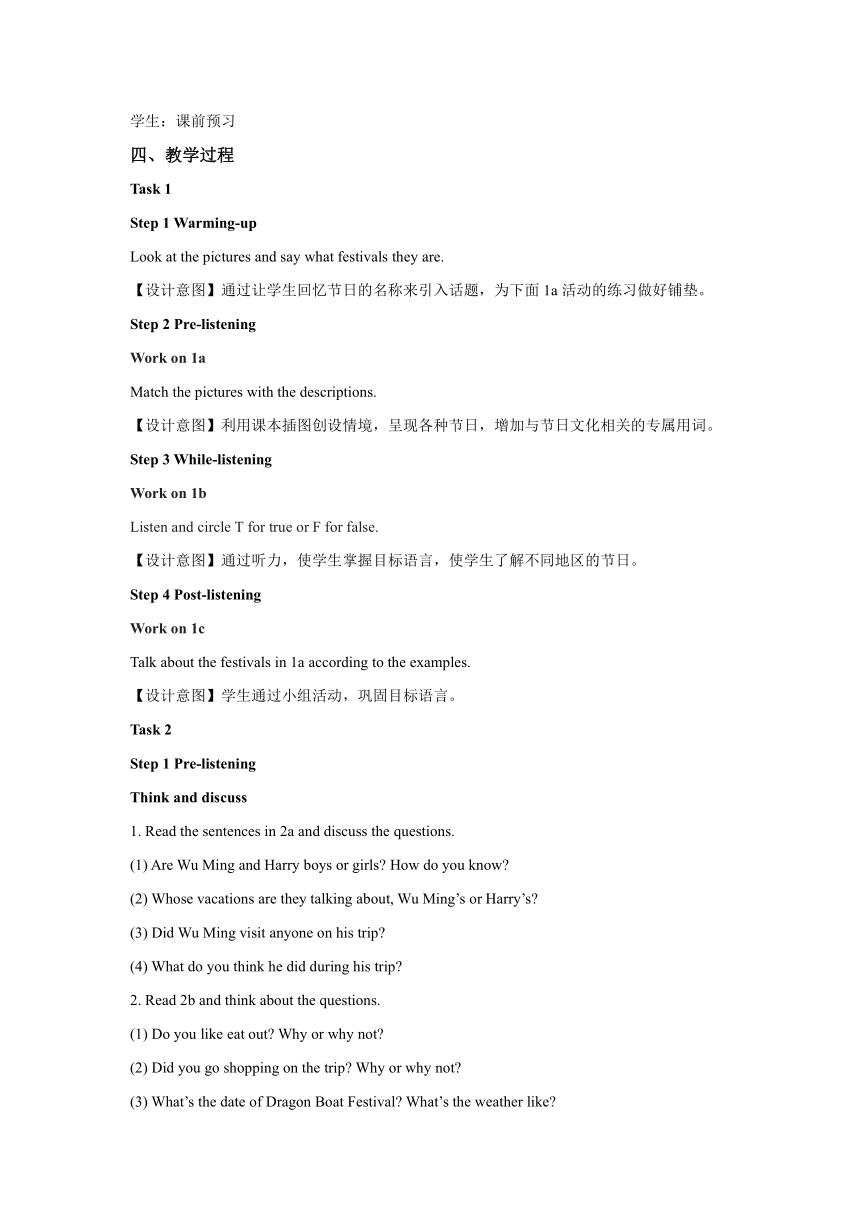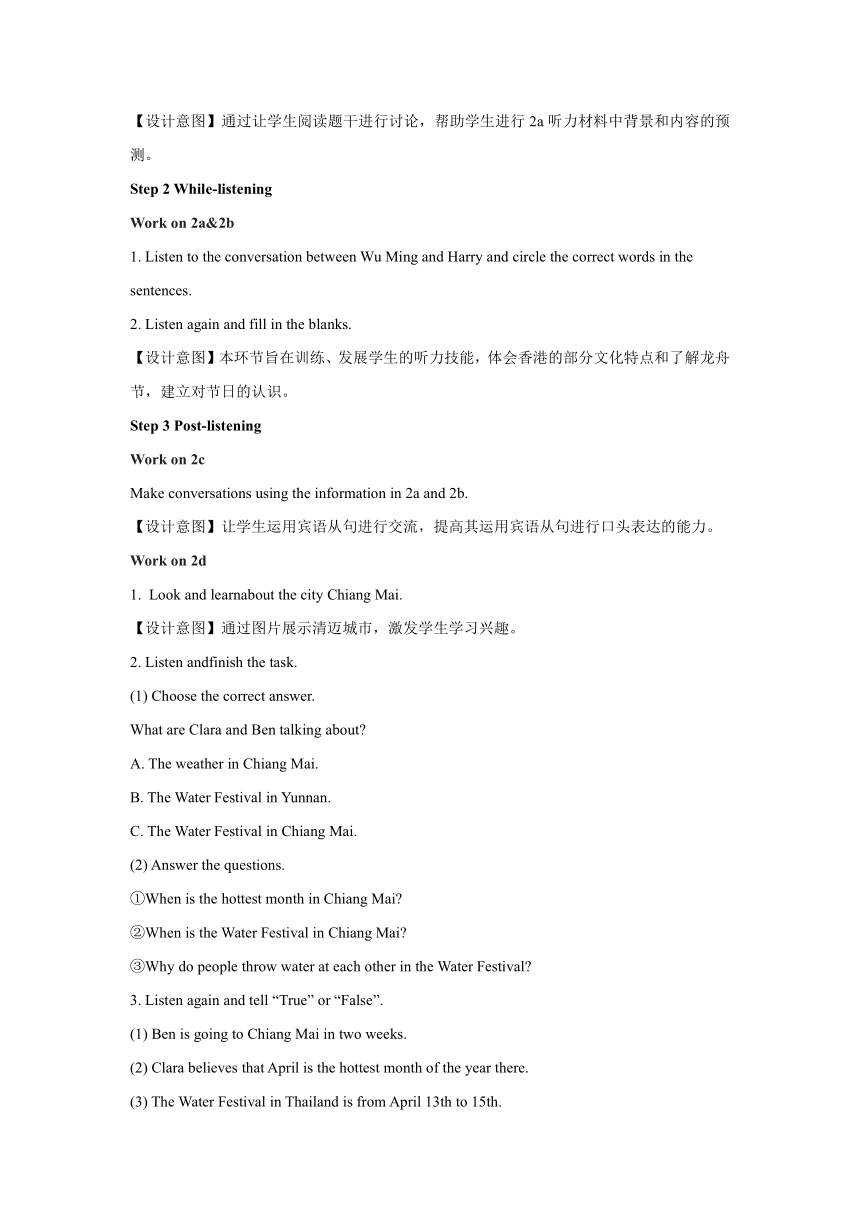人教版九年级全一册 Unit 2 I think that mooncakes are delicious! Section A (1a-2d) 教案
文档属性
| 名称 | 人教版九年级全一册 Unit 2 I think that mooncakes are delicious! Section A (1a-2d) 教案 |  | |
| 格式 | docx | ||
| 文件大小 | 41.0KB | ||
| 资源类型 | 教案 | ||
| 版本资源 | 人教新目标(Go for it)版 | ||
| 科目 | 英语 | ||
| 更新时间 | 2022-07-30 10:13:33 | ||
图片预览



文档简介
Unit 2 I think that mooncakes are delicious
Section A (1a-2d)
一、教学目标
1.熟练掌握下列词汇和短语:stranger, relative, pound,the Water Festival, the Dragon Boat Festival,the Chinese Spring Festival,the Lantern Festival, eat out, put on
2. 掌握并运用下列句型:
What a great day!
How fantastic the dragon boat teams were!
What do you like best about the Dragon Boat Festival
I think that they’re fun to watch.
Bill wonders whether they’ll have zongzi again next year.
Bill and Mary believe that they’ll be back next year to watch the races.
What did you do on your vacation
I wonder if it’s similar to the Water Festival of Dai people in Yunnan Province.
3. 能使用what和how句式表达对某事物的感叹,培养学生用正确而科学的方法表达情感的能力、初步了解that, if/whether引导的宾语从句。
4. 指导学生仔细聆听有关描述节日活动的对话,并使其学会运用所学内容谈论节日活动。
5. 能表达自己的态度或做出回应。
6. 引导学生通过小组合作来学习节日,主要了解我国传统节日及风俗习惯,增长见识。
7. 学会运用宾语从句来表达自己对节日的看法和观点。
二、教学重点及难点
重点:
1.掌握本单元出现的与节日相关的词汇、短语及目标语言。
2. 学习使用what和how句式表达对某事物的感叹。
3. 运用that, if/whether引导的宾语从句来表达句子并谈论对节日的喜好。
难点:学会运用宾语从句来表达自己对节日的看法和观点。
三、教学准备
教师:教学课件;多媒体设备
学生:课前预习
四、教学过程
Task 1
Step 1 Warming-up
Look at the pictures and say what festivals they are.
【设计意图】通过让学生回忆节日的名称来引入话题,为下面1a活动的练习做好铺垫。
Step 2 Pre-listening
Work on 1a
Match the pictures with the descriptions.
【设计意图】利用课本插图创设情境,呈现各种节日,增加与节日文化相关的专属用词。
Step 3 While-listening
Work on 1b
Listen and circle T for true or F for false.
【设计意图】通过听力,使学生掌握目标语言,使学生了解不同地区的节日。
Step 4 Post-listening
Work on 1c
Talk about the festivals in 1a according to the examples.
【设计意图】学生通过小组活动,巩固目标语言。
Task 2
Step 1 Pre-listening
Think and discuss
1. Read the sentences in 2a and discuss the questions.
(1) Are Wu Ming and Harry boys or girls How do you know
(2) Whose vacations are they talking about, Wu Ming’s or Harry’s
(3) Did Wu Ming visit anyone on his trip
(4) What do you think he did during his trip
2. Read 2b and think about the questions.
(1) Do you like eat out Why or why not
(2) Did you go shopping on the trip Why or why not
(3) What’s the date of Dragon Boat Festival What’s the weather like
【设计意图】通过让学生阅读题干进行讨论,帮助学生进行2a听力材料中背景和内容的预测。
Step 2 While-listening
Work on 2a&2b
1. Listen to the conversation between Wu Ming and Harry and circle the correct words in the
sentences.
2. Listen again and fill in the blanks.
【设计意图】本环节旨在训练、发展学生的听力技能,体会香港的部分文化特点和了解龙舟节,建立对节日的认识。
Step 3 Post-listening
Work on 2c
Make conversations using the information in 2a and 2b.
【设计意图】让学生运用宾语从句进行交流,提高其运用宾语从句进行口头表达的能力。
Work on 2d
Look and learnabout the city Chiang Mai.
【设计意图】通过图片展示清迈城市,激发学生学习兴趣。
2. Listen andfinish the task.
(1) Choose the correct answer.
What are Clara and Ben talking about
A. The weather in Chiang Mai.
B. The Water Festival in Yunnan.
C. The Water Festival in Chiang Mai.
(2) Answer the questions.
①When is the hottest month in Chiang Mai
②When is the Water Festival in Chiang Mai
③Why do people throw water at each other in the Water Festival
3. Listen again and tell “True” or “False”.
(1) Ben is going to Chiang Mai in two weeks.
(2) Clara believes that April is the hottest month of the year there.
(3) The Water Festival in Thailand is from April 13th to 15th.
(4) The Thai New Year is a time for cleaning and washing bad things.
【设计意图】通过设置题目,让学生获取对话主要内容和一些细节信息,锻炼学生快速获取信息的能力,为下一步的表演对话作铺垫。
4. Role-play the conversation.
【设计意图】通过角色扮演,帮助学生在情境中加深对话题语言的口语模仿。
Language points
1. How fantastic the dragon boat teams were! 龙舟队真是太棒了!
此句为How引导的感叹句,表示说话时的喜悦、惊讶等感情。
【拓展】句型:How+ 形容词/副词+(主语+谓语)!How+ 形容词+ a/an +名词单数+主语+谓语!
e.g. How clever the girl is!
2. What a great day! 多么棒的一天啊!
此句为What引导的感叹句,表示说话时的喜悦、惊讶等感情。
【拓展】句型:What+ a/an+ 形容词+ 名词单数+(主语+谓语)!What+ 形容词+ 名词复数+(主语+谓语)!What+ 形容词+ 不可数名词(主语+谓语)!
e.g. What exciting news it is!
3. Bill wonders whether they’ll have zongzi again next year. 比尔想知道明年他们是否还会吃粽子。
(1) wonder意为“想知道”,相当于 want to know。
wonder在不同的句式中表达的意思也不同:
①后接 who, what, why等连接词引导的宾语从句。
e.g. The girl wonders what is the secret to grammar learning.
②后接if或whether引导的宾语从句时,表示一种委婉的请求或疑问。
e.g. I wonder if you can help me with my English.
(2) whether 作连词,意为“是否”,用于表示选择或对某事不确定。
e.g. I don’t know whether he paid attention to what I said.
4. Bill and Mary believe that they’ll be back next year to watch the races. 比尔和玛丽相信明年他们将会回来看比赛。
believe 意为“相信;认为有可能”,后面接名词或代词作宾语,也可以跟that引导的宾语从句,还可以用believe sb. to be的形式。
e.g. I believe that knowledge comes from questioning.
5. I’ve put on five pounds! 我胖了5磅!
put on 意为“增加(体重);发胖”。
e.g. She eats too much, so she puts on weight.
【拓展】put on 还可以翻译为“穿上;戴上”,“上演;举办”。
e.g. He put on his new coat and went out.
6. I’m going to Chiang Mai in two weeks. 两周后我打算去清迈。
in two weeks 意为“两周后”,“in+ 一段时间”和将来时连用,意为“某段时间以后”。
e.g. He’ll be back in 5 days.
7. I wonder if it’s similar to the Water Festival of the Dai people in Yunnan Province. 我想知道它是否和云南省傣族的泼水节相似。
be similar to 意为“与……相似的”。
e.g. A cat is similar to a tiger in many ways.
【设计意图】通过知识讲解和练习,学习新的语言点。
Step 4 Summary
Key words and phrases:
stranger, relative, pound, the Water Festival, the Dragon Boat Festival, the Chinese Spring Festival, the Lantern Festival, eat out, put on
Key sentences:
What a great day!
How fantastic the dragon boat teams were!
What do you like best about the Dragon Boat Festival
I think that they’re fun to watch.
Bill wonders whether they’ll have zongzi again next year.
Bill and Mary believe that they’ll be back next year to watch the races.
What did you do on your vacation
I wonder if it’s similar to the Water Festival of Dai people in Yunnan Province.
Step 5 Homework
Make a survey about your friend’s favorite festivals and the reasons.
五、板书设计
Unit 2 I think that mooncakes are delicious!
第1课时 Section A (1a-2d)
Key words and phrases:
stranger, relative, pound, the Water Festival, the Dragon Boat Festival, the Chinese Spring Festival, the Lantern Festival, eat out, put on
Key sentences:
What a great day!
How fantastic the dragon boat teams were!
What do you like best about the Dragon Boat Festival
I think that they’re fun to watch.
Bill wonders whether they’ll have zongzi again next year.
Bill and Mary believe that they’ll be back next year to watch the races.
What did you do on your vacation
I wonder if it’s similar to the Water Festival of Dai people in Yunnan Province.
Section A (1a-2d)
一、教学目标
1.熟练掌握下列词汇和短语:stranger, relative, pound,the Water Festival, the Dragon Boat Festival,the Chinese Spring Festival,the Lantern Festival, eat out, put on
2. 掌握并运用下列句型:
What a great day!
How fantastic the dragon boat teams were!
What do you like best about the Dragon Boat Festival
I think that they’re fun to watch.
Bill wonders whether they’ll have zongzi again next year.
Bill and Mary believe that they’ll be back next year to watch the races.
What did you do on your vacation
I wonder if it’s similar to the Water Festival of Dai people in Yunnan Province.
3. 能使用what和how句式表达对某事物的感叹,培养学生用正确而科学的方法表达情感的能力、初步了解that, if/whether引导的宾语从句。
4. 指导学生仔细聆听有关描述节日活动的对话,并使其学会运用所学内容谈论节日活动。
5. 能表达自己的态度或做出回应。
6. 引导学生通过小组合作来学习节日,主要了解我国传统节日及风俗习惯,增长见识。
7. 学会运用宾语从句来表达自己对节日的看法和观点。
二、教学重点及难点
重点:
1.掌握本单元出现的与节日相关的词汇、短语及目标语言。
2. 学习使用what和how句式表达对某事物的感叹。
3. 运用that, if/whether引导的宾语从句来表达句子并谈论对节日的喜好。
难点:学会运用宾语从句来表达自己对节日的看法和观点。
三、教学准备
教师:教学课件;多媒体设备
学生:课前预习
四、教学过程
Task 1
Step 1 Warming-up
Look at the pictures and say what festivals they are.
【设计意图】通过让学生回忆节日的名称来引入话题,为下面1a活动的练习做好铺垫。
Step 2 Pre-listening
Work on 1a
Match the pictures with the descriptions.
【设计意图】利用课本插图创设情境,呈现各种节日,增加与节日文化相关的专属用词。
Step 3 While-listening
Work on 1b
Listen and circle T for true or F for false.
【设计意图】通过听力,使学生掌握目标语言,使学生了解不同地区的节日。
Step 4 Post-listening
Work on 1c
Talk about the festivals in 1a according to the examples.
【设计意图】学生通过小组活动,巩固目标语言。
Task 2
Step 1 Pre-listening
Think and discuss
1. Read the sentences in 2a and discuss the questions.
(1) Are Wu Ming and Harry boys or girls How do you know
(2) Whose vacations are they talking about, Wu Ming’s or Harry’s
(3) Did Wu Ming visit anyone on his trip
(4) What do you think he did during his trip
2. Read 2b and think about the questions.
(1) Do you like eat out Why or why not
(2) Did you go shopping on the trip Why or why not
(3) What’s the date of Dragon Boat Festival What’s the weather like
【设计意图】通过让学生阅读题干进行讨论,帮助学生进行2a听力材料中背景和内容的预测。
Step 2 While-listening
Work on 2a&2b
1. Listen to the conversation between Wu Ming and Harry and circle the correct words in the
sentences.
2. Listen again and fill in the blanks.
【设计意图】本环节旨在训练、发展学生的听力技能,体会香港的部分文化特点和了解龙舟节,建立对节日的认识。
Step 3 Post-listening
Work on 2c
Make conversations using the information in 2a and 2b.
【设计意图】让学生运用宾语从句进行交流,提高其运用宾语从句进行口头表达的能力。
Work on 2d
Look and learnabout the city Chiang Mai.
【设计意图】通过图片展示清迈城市,激发学生学习兴趣。
2. Listen andfinish the task.
(1) Choose the correct answer.
What are Clara and Ben talking about
A. The weather in Chiang Mai.
B. The Water Festival in Yunnan.
C. The Water Festival in Chiang Mai.
(2) Answer the questions.
①When is the hottest month in Chiang Mai
②When is the Water Festival in Chiang Mai
③Why do people throw water at each other in the Water Festival
3. Listen again and tell “True” or “False”.
(1) Ben is going to Chiang Mai in two weeks.
(2) Clara believes that April is the hottest month of the year there.
(3) The Water Festival in Thailand is from April 13th to 15th.
(4) The Thai New Year is a time for cleaning and washing bad things.
【设计意图】通过设置题目,让学生获取对话主要内容和一些细节信息,锻炼学生快速获取信息的能力,为下一步的表演对话作铺垫。
4. Role-play the conversation.
【设计意图】通过角色扮演,帮助学生在情境中加深对话题语言的口语模仿。
Language points
1. How fantastic the dragon boat teams were! 龙舟队真是太棒了!
此句为How引导的感叹句,表示说话时的喜悦、惊讶等感情。
【拓展】句型:How+ 形容词/副词+(主语+谓语)!How+ 形容词+ a/an +名词单数+主语+谓语!
e.g. How clever the girl is!
2. What a great day! 多么棒的一天啊!
此句为What引导的感叹句,表示说话时的喜悦、惊讶等感情。
【拓展】句型:What+ a/an+ 形容词+ 名词单数+(主语+谓语)!What+ 形容词+ 名词复数+(主语+谓语)!What+ 形容词+ 不可数名词(主语+谓语)!
e.g. What exciting news it is!
3. Bill wonders whether they’ll have zongzi again next year. 比尔想知道明年他们是否还会吃粽子。
(1) wonder意为“想知道”,相当于 want to know。
wonder在不同的句式中表达的意思也不同:
①后接 who, what, why等连接词引导的宾语从句。
e.g. The girl wonders what is the secret to grammar learning.
②后接if或whether引导的宾语从句时,表示一种委婉的请求或疑问。
e.g. I wonder if you can help me with my English.
(2) whether 作连词,意为“是否”,用于表示选择或对某事不确定。
e.g. I don’t know whether he paid attention to what I said.
4. Bill and Mary believe that they’ll be back next year to watch the races. 比尔和玛丽相信明年他们将会回来看比赛。
believe 意为“相信;认为有可能”,后面接名词或代词作宾语,也可以跟that引导的宾语从句,还可以用believe sb. to be的形式。
e.g. I believe that knowledge comes from questioning.
5. I’ve put on five pounds! 我胖了5磅!
put on 意为“增加(体重);发胖”。
e.g. She eats too much, so she puts on weight.
【拓展】put on 还可以翻译为“穿上;戴上”,“上演;举办”。
e.g. He put on his new coat and went out.
6. I’m going to Chiang Mai in two weeks. 两周后我打算去清迈。
in two weeks 意为“两周后”,“in+ 一段时间”和将来时连用,意为“某段时间以后”。
e.g. He’ll be back in 5 days.
7. I wonder if it’s similar to the Water Festival of the Dai people in Yunnan Province. 我想知道它是否和云南省傣族的泼水节相似。
be similar to 意为“与……相似的”。
e.g. A cat is similar to a tiger in many ways.
【设计意图】通过知识讲解和练习,学习新的语言点。
Step 4 Summary
Key words and phrases:
stranger, relative, pound, the Water Festival, the Dragon Boat Festival, the Chinese Spring Festival, the Lantern Festival, eat out, put on
Key sentences:
What a great day!
How fantastic the dragon boat teams were!
What do you like best about the Dragon Boat Festival
I think that they’re fun to watch.
Bill wonders whether they’ll have zongzi again next year.
Bill and Mary believe that they’ll be back next year to watch the races.
What did you do on your vacation
I wonder if it’s similar to the Water Festival of Dai people in Yunnan Province.
Step 5 Homework
Make a survey about your friend’s favorite festivals and the reasons.
五、板书设计
Unit 2 I think that mooncakes are delicious!
第1课时 Section A (1a-2d)
Key words and phrases:
stranger, relative, pound, the Water Festival, the Dragon Boat Festival, the Chinese Spring Festival, the Lantern Festival, eat out, put on
Key sentences:
What a great day!
How fantastic the dragon boat teams were!
What do you like best about the Dragon Boat Festival
I think that they’re fun to watch.
Bill wonders whether they’ll have zongzi again next year.
Bill and Mary believe that they’ll be back next year to watch the races.
What did you do on your vacation
I wonder if it’s similar to the Water Festival of Dai people in Yunnan Province.
同课章节目录
- Unit 1 How can we become good learners.
- Section A
- Section B
- Unit 2 I think that mooncakes are delicious!
- Section A
- Section B
- Unit 3 Could you please tell me where the restroom
- Section A
- Section B
- Unit 4 I used to be afraid of the dark.
- Section A
- Section B
- Unit 5 What are the shirts made of?
- Section A
- Section B
- Review of Units 1-5
- Unit 6 When was it invented?
- Section A
- Section B
- Unit 7 Teenagers should be allowed to choose their
- Section A
- Section B
- Unit 8 It must belong to Carla.
- Section A
- Section B
- Unit 9 I like music that I can dance to.
- Section A
- Section B
- Unit 10 You're supposed to shake hands.
- Section A
- Section B
- Review of Units 6-10
- Unit 11 Sad movies make me cry.
- Section A
- Section B
- Unit 12 Life is full of the unexpected
- Section A
- Section B
- Unit 13 We're trying to save the earth!
- Section A
- Section B
- Unit 14 I remember meeting all of you in Grade 7.
- Section A
- Section B
- Review of Units 11-14
